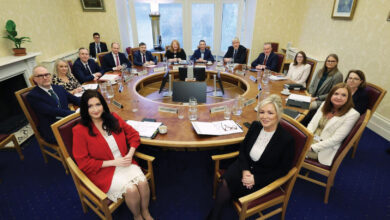TRADE UNION DESK: Learning from Covid

Austerity in the name of fiscal responsibility has been proven not to work in the past but is still being pursued in the present, writes the ICTU’s John O’Farrell. The UK Covid Inquiry presents an opportunity to examine the state of our state and the health of our society and democracy.
The UK Covid Inquiry opened its doors in June 2023, and who should breeze in but David Cameron and ‘George’ Osborne, airily dismissing evidence that the consequences of the decade of austerity they unleashed had “depleted health and social care capacity and rising inequality in the UK”.
On the contrary, sneered Gideon (Osborne): “If we had not done that Britain would have been more exposed, not just to future things like the coronavirus pandemic, but indeed to the fiscal crisis which very rapidly followed in countries across Europe.”
This is the point where we pause and remind ourselves that UK public sector debt increased from 62.4 per cent of GDP in the 2009/10 financial year to 95.5 per cent of GDP in the 2021/22 financial year.
Regardless of that, the Government is determined to enshrine ‘Austerity 2.0’ by tackling inflation caused by Russian imperialism and energy prices, Brexit’s impact on imports, corporate profiteering and the necessary spending during the pandemic, by addressing none of the above and focusing on public servants as the source of price hikes.
And here, in Northern Ireland, we are seeing that magnified by a Secretary of State who is punishing workers and service users while acting as if he is taking on a recalcitrant political class who refuse to take responsibility themselves in Stormont. As ever, what is notable about ‘posh populism’ is loudly declaring itself as kicking out at the elites, while actually kicking down the social hierarchy.
While those at the lower rungs of the ladder may complain to those they have elected, they are the ones feeling most of the pain, leaving it ironically easier for the local political class to blame heartless Tories in London.
What was true about the damage caused by ‘Austerity 1.0’ to state capacity is still true during its revival. What hindsight offers us now is the bigger picture, as detailed by ICTU’s Gerry Murphy to the Covid Inquiry: “In the 10 years between 2010 and 2020, the grant for Resource DEL was £177 million below what it was in 2009/10, a 1.6 per cent reduction while public expenditure on health continued to increase by around 6 per cent annually. By 2020, current spending pressures, including health, were estimated to be in the region of £500 million per annum.
“There was a boost to capital spending in 2019/20 which brought the total spend to within £10 million of the 2009/10 spend. However, capital spending fell back in cash terms in 2020/21 and was £137 million or 9.2 per cent below where it was in 2019/10 in real terms.
“The cumulative loss in capital spending in the 10 years to 2020 was £4.2 billion. It was estimated in 2020 that the Northern Ireland Executive has a backlog of capital expenditure projects totalling £5 billion, and this is likely to have increased substantially in the years since.”
Every single day brings some petty act of penny pinching in the name of fiscal responsibility: ‘Patients waiting for days in Emergency Department’; ‘No money for health staff pay rises in Northern Ireland’; ‘Funding for primary school nurture classes being cut’; ‘Top civil servant says departments have reached cuts limit’; ‘Energy bills in Northern Ireland to rise as government discount ends’; ‘Dramatic cuts to education in Northern Ireland must be reversed, say experts’; ‘One in six people face hunger in Northern Ireland’.
Like the Bourbons, our reluctant direct rulers have forgotten nothing, and learnt nothing. The Covid Inquiry is an opportunity to examine across six modules, the state of our state and the health of our society and democracy.
Module 1 is looking at preparedness and resilience. We have been found wanting. The next series of modules (outlined below) will shine light on the slow-burning issues which tend not to make headline ‘news’, but which could write a renewed narrative for a progressive response to the vandalism and looting of the public realm over the past decade.
|
1. Resilience and preparedness. 2. Core UK decision-making and political governance. 3. Impact of Covid-19 pandemic on healthcare systems in the four nations of the UK. 4. Vaccines and therapeutics. 5. Government procurement. 6. Care sector. |





